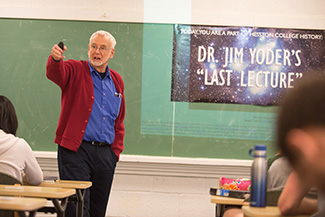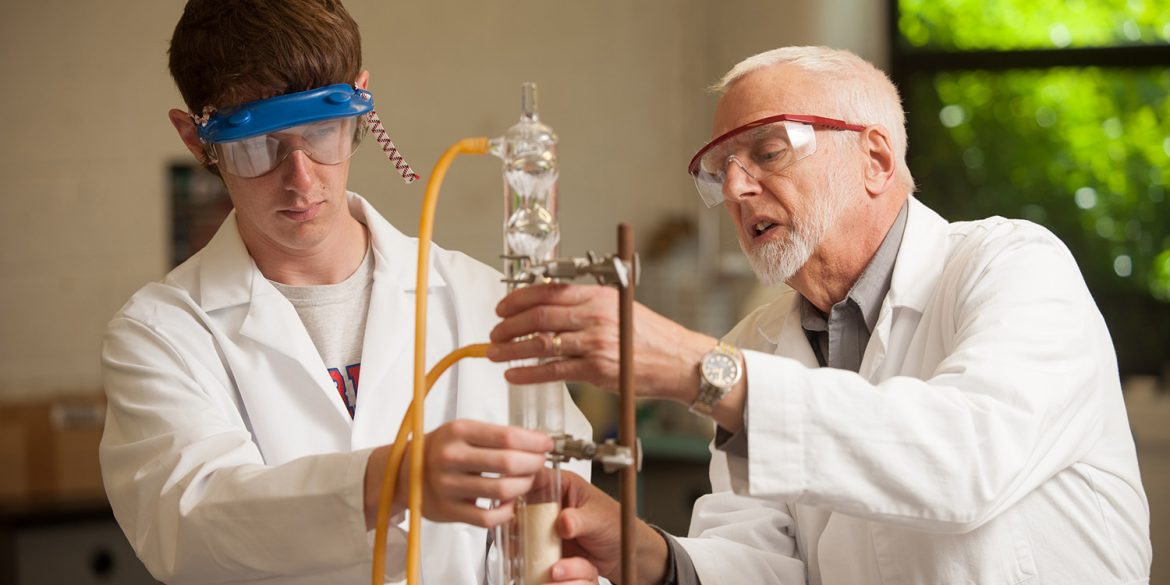by Mackenzie Miller ’18
After 50 years of impacting Hesston College students and colleagues, Dr. Jim Yoder ’62 brought a close to a life chapter as he retired from teaching at the end of the 2017-18 year, leaving behind the longest teaching legacy to date.
As the son of a college professor, Yoder always knew he wanted to be a teacher. His father, Paton Yoder, was a founding faculty member of Westmont College (Santa Barbara, Calif.), taught history at four liberal arts colleges and served as dean at Hesston from 1961-70.
“I was quite clear I wanted to be a college teacher like dad,” Yoder said. “But what I was going to teach didn’t become clear until I was a junior at Goshen.”
Starting as a college freshman at Taylor University (Upland, Ind.), Yoder transferred to Hesston College for his sophomore year as Paton stepped into the role of academic dean. But it was at Goshen (Ind.) College, following completion of his year at Hesston, that Yoder chose from among his interests in the sciences, literature and drama to pursue his passion for chemistry.
“Chemistry made so much sense,” Yoder said. “I think it was partly because literature was too nebulous for me. I wanted things more crystal, more sorted out.”
The bond was instantaneous, and Yoder dedicated the rest of his life to the sciences, obtaining his Ph.D. in organic chemistry with minors in physical chemistry and philosophy of science from Indiana University (Bloomington, Ind.).
Then it was straight back to Hesston College to teach in September 1968.
“When it came to Hesston, I found what a blessing it was to have my weekday community and my Sunday community the same,” Yoder said. “There was a coming home-ness when they were the same.”
Yoder first taught General Chemistry I and II alongside Organic Chemistry I and II. Later, because of his interest in the universe and cosmos, Yoder launched an astronomy course that scores of Hesston College students – even those who are not science majors – have been through as a general education science option.
In the classroom, a commitment to science alongside faith was always an important topic to Yoder.

Curtis Oesch ’18 (Caldwell, Idaho) appreciated the willingness with which Yoder tackled difficult topics such as this with his students.
“In places where many people see conflict between Biblical teaching and science, Jim sees logical explanation that allows the two to be in agreement,” Oesch said. “He told me more than once that there doesn’t have to be conflict and it doesn’t have to become a choice whether to believe the Bible or science. The two can coexist and even support each other if you read each one in the appropriate context.”
Throughout his fifty years on faculty, Yoder took several sabbaticals. Under Mennonite Central Committee, Yoder and his family traveled to Swaziland from 1979-81 where Yoder taught at the University of Swaziland. He was then named a Fulbright Scholar in 2007 and returned to Swaziland. He also spent several summers and periods of sabbatical as an adjunct instructor at Bethel College (North Newton, Kan.), Tabor College (Hillsboro, Kan.) and Wichita (Kan.) State University.
But Yoder always returned to his home in Hesston.
“A teacher can only have an impact on a limited number of people no matter where they’re at – a big university or a small one,” Yoder said. “And so, if that’s the goal, then it doesn’t matter where you teach.”
Yoder has seen many transitions during his time at Hesston, but the biggest changes? The students and technology.
In 1968, Yoder began teaching with slide-rules, the “old-fashioned calculator,” as he called them, and mimeograph-graded tests. But with the introduction of calculators and advancement of computer, student interactions with science transformed. Yoder has also seen the effects.
“As technology advanced, I didn’t have to spend so much time in the lab or the classroom on tedium things and the details,” Yoder said. “I could focus more on concepts, on the bigger picture.”
As technology changed, so too did Hesston College students.
“I walk around campus, and I hear the birds, and I see the trees, and I wonder how many students notice birds singing and trees,” Yoder said. “Students don’t notice those things as much, and they’re not out as much as they used to be.”
While this changes the interaction of students in the classroom, Yoder still found ways to connect with them in other areas on campus.
Beyond the classroom, Yoder had opportunities to maintain his love for theatre, playing a variety of roles in Hesston College Theatre productions. His final role was Dr. Stokes in the college’s spring 2018 production of Hands on a Hardbody.
The mark Yoder has left at Hesston College will continue to live on for future generations through the excellence he established in the chemistry program. As he continues to discover what the next chapter holds for him, Yoder noted that the impact of his work is seen best through his students, many who have established notable careers in science-related fields.
“That’s the legacy of a teacher,” Yoder said. “No matter where they are, their students go on and become bigger and better than they are.”


